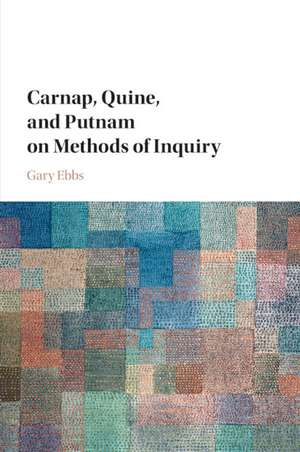Carnap, Quine, and Putnam on Methods of Inquiry
Autor Gary Ebbsen Limba Engleză Paperback – 2 ian 2019
Preț: 285.37 lei
Nou
Puncte Express: 428
Preț estimativ în valută:
54.61€ • 56.69$ • 45.54£
54.61€ • 56.69$ • 45.54£
Carte tipărită la comandă
Livrare economică 22 martie-05 aprilie
Preluare comenzi: 021 569.72.76
Specificații
ISBN-13: 9781316630853
ISBN-10: 1316630854
Pagini: 290
Dimensiuni: 153 x 230 x 20 mm
Greutate: 0.4 kg
Editura: Cambridge University Press
Colecția Cambridge University Press
Locul publicării:Cambridge, United Kingdom
ISBN-10: 1316630854
Pagini: 290
Dimensiuni: 153 x 230 x 20 mm
Greutate: 0.4 kg
Editura: Cambridge University Press
Colecția Cambridge University Press
Locul publicării:Cambridge, United Kingdom
Cuprins
Part I. Carnap: 1. Carnap's logical syntax; 2. Carnap on ontology; Part II. Carnap and Quine: 3. Carnap and Quine on truth by convention; 4. Quine's naturalistic explication of Carnap's logic of science; Part III. Quine: 5. Quine gets the last word; 6. Reading Quine's claim that definitional abbreviations create synonymies; 7. Can logical truth be defined in purely extensional terms?; 8. Reading Quine's claim that no statement is immune to revision; Part IV. Quine and Putnam: 9. Conditionalization and conceptual change: Chalmers in defense of a dogma; 10. Truth and trans-theoretical terms; Part V. Putnam: 11. Putnam and the contextually apriori.
Recenzii
'Ebbs' volume … is an important publication from both an historical and a systematic point of view. It offers a new perspective on the relation between Carnap, Quine, and Putnam, as well as a substantive contribution to ongoing systematic debates about truth, justification, and language use. As such, it will be of interest and value not only to historians of analytic philosophy, but also to all philosophers who believe that Carnap's, Quine's, and Putnam's most fundamental insights deserve continuous discussion and adaptation.' Notre Dame Philosophical Reviews
Notă biografică
Descriere
This volume critically examines the work of three eminent twentieth-century philosophers, Carnap, Quine, and Putnam, engaging with and developing their answers to key methodological questions.
